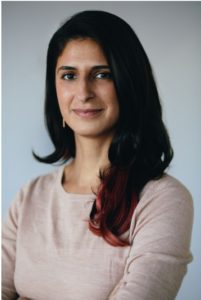
September is #Alumni Month!
As we are approaching the Alumni event of 2019, we would like to introduce you to one of our extraordinary alumna Nina Tandon. Nina studied the the non-invasive lung cancer detection system while in Italy, and is now the Co-Founder and CEO of EpiBone.
Nina compared the health of Americans and Europeans during her time in Italy and was eventually inspired to bring her company EpiBone to life. EpiBone is a company that grows living bone and cartilage grafts from patient’s stem cells.
#1 At what point in your academic and professional career did you decide to apply to a Fulbright grant?
After my undergraduate degree, I worked for several years a software engineer, but still had a strong desire to return to academia continue my education and graduate work. I applied to my Fulbright before starting my PhD.
#2 Why Italy and why the Fulbright program?
I studied Italian in college, and have always had a love for the language and people of Italy. I also felt that while Italy is well-known in modern times for its art and architecture, it has been over looked in recent years for its scientific contributions, and I thought that I could help call attention to Italy’s deep history of scientific advancement. As for choosing the Fulbright program, I was luck enough to have a classmate who received a Fulbright to study in Spain, and they were a huge help in introducing me to the opportunities with Fulbright, as well as inspiring me to apply to the program.
#3 What do you currently do and did your Fulbright grant contribute to it?
I’m currently the CEO and Co-Founder of a company called EpiBone, where we grow living bone and cartilage grafts from patient’s stem cells. While I was participating in the Fulbright program in Italy, I worked on a non-invasive lung cancer detection system that really grew my interest in trying to create ways to improve the health and well-being of humanity as a whole. I was also able to see first hand the differences between American and European health care systems, all of which inspired me to bring EpiBone to life. Perhaps the biggest contribution the Fulbright program had on my career, was the exposure to talented Italian students. In fact, one of those students, Elisa Cimetta, helped to co-found EpiBone, and is now a Professor at the University of Padova!
#4 What would you say to young students and scholars who are considering applying to a Fulbright award?
I would tell them not to hesitate in applying, and to really consider studying in Italy! There is a world of opportunity that comes with a Fulbright award, and it cannot be understated how important it is to have a global view on education and career development. Programs like the Fulbright really do have the power to foster peace in the world.
